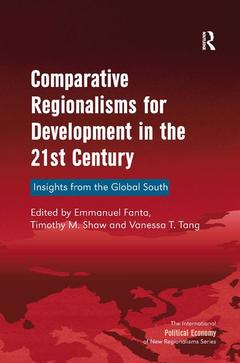Description
Comparative Regionalisms for Development in the 21st Century
Insights from the Global South
New Regionalisms Series
Author: Shaw Timothy M.
Coordinator: Fanta Emmanuel
Language: English
Subject for Comparative Regionalisms for Development in the 21st Century:
Keywords
integration; economic; partnership; agreement; communities; processes; southern; african; community; recs; National Poverty Eradication Programmes; CARICOM Member State; SADC Tribunal; Pe Rc; COMESA Secretariat; SALW; EITI; ECOWAS Court; African RECs; Civil Society; AEC Treaty; Regional Integration; AEC; ECOWAS Parliament; EPA Negotiation; Banjul Charter; OECD DAC Donor; Abuja Treaty; EAC Partner States; ECOWAS Treaty; Human Rights Jurisdiction; Supplementary Protocol; Global Social Policy; SADC Parliamentary Forum
Support: Print on demand
Description
/li>Contents
/li>Biography
/li>




